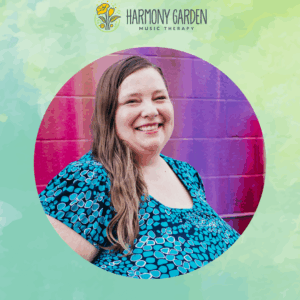Defying Dementia
Macayla here–
I’ve mentioned before that one of my favorite parts of working at Harmony Garden is being able to work with elderly patients–particularly, in hospice.
When I tell people that I am a hospice music therapist, most people say something like “aw, that’s so sweet. I bet they enjoy having you come sing to them.” But to me, the connection and profundity of the ways I get to serve people is a much higher privilege than that.
Several years back, I had a patient named Tori (this is, of course, not her real name). Tori suffered with terrible anxiety due to late stage dementia and some compounding mental health disorders. She was often grumpy and rude to her caretakers, but under that strong layer of emotion, Tori was confused and scared, very often not knowing where she was or why she was there.
As I recall, she didn’t like me at first, so I let the music do the work. As I began to play familiar songs, not only did every bit of Tori soften, but she surprised me by singing along in harmony!
The music therapy literature shows that even when patients with Alzheimers or Dementia can no longer remember their family members or their own name, they can often still remember entire songs from when they were in their teens or twenties.
This was true for Tori. Because her memory was declining so drastically, she often repeated herself mere minutes or seconds after telling a story or asking a question; however, not only could she remember the words to many songs, but the harmonic chord progressions of the songs as well.
One of her favorite songs, I soon discovered, was an old gospel song called “Just a Closer Walk With Thee.” Tori always sang harmony, adding a true gospel I-IV-I feel by singing a moving harmony line at the final phrase of the verses and chorus. Every time she sang it, her eyes would light up and she would say “I don’t know how I knew to sing that, but I just knew it!”
Watch the video below to hear some of Tori’s harmonies
Tori had been a competent and talented musician as well as a strong and accomplished woman from what I could gather about her. Living day to day in a constant state of confusion was bound to cause anxiety and negative behavior toward her caretakers, but when we made music together, in that moment, she knew exactly who she was and what she was doing — and it made sense in the context of another person’s reality too.
I went to see Tori every week, and every week she would light up and say “Oh good! You’re back!” … until one day many months later, she didn’t.
She didn’t remember me. She didn’t recognize me. She didn’t have any recollection of any of our sessions.
Honestly, it threw me, and I had to cover my surprise while I mentally regrouped and back-tracked to introduce myself in a safe way. (Rookie music therapist mistake.)
We were back at square one. She didn’t want company, and she didn’t want to hear any music. Tension coursed through her body.
I spoke gently as I pulled out my guitar. I acknowledged her reality, accepted her fear, and asked her to trust me for one song. She agreed.
As I began to sing “Just a closer walk with Thee,” her body softened as it always did. She leaned her head back and said, “That’s it… I know your smile” and began to sing her harmony.
By the end of the song, all was back to normal and she carried on as if she had known me her entire life. Her brain had found all the neural connections it needed to bring back the lyrics, melody, and harmony from those beloved songs of old, and in that moment, she was safe and she was wholly herself.
Click here to see how music therapy may benefit your elderly loved one!




